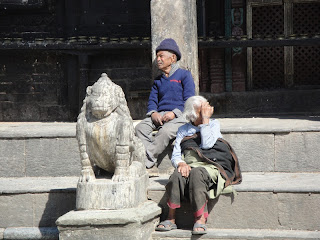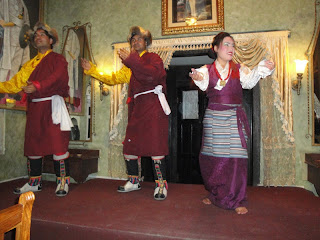This day's sightseeing tour starts by traveling to Chovar and its vast gorge. First we stop to visit the Jal Binayak Temple ... steps down.
Then we walk over the suspension bridge.
Legend has it that the god Manjushree created this gorge so he could use it to drain the water from the Kathmandu Valley when it was still a lake. So many stories!
Shouldn't this bolt be attached to something?
The new bridge right next to it.
We have a wonderful panoramic view from here ... if it wasn't for the awful stink out of the water underneath the suspension bridge which chased us away very fast.
You can see the temple from here too.
First we visit the village of Khokana.
Khokana, a traditional and tiny Newari village eight kilometers south of Kathmandu (on the outskirts of Patan), which has its own history and has retained its tradition and culture. It is a living museum and recalls medieval times. The farming community of Newars who live here are mostly dependent on agriculture and much of their daily activities take place outside of their dwellings.
Yes, ducks and dogs! Everywhere!
There are women sitting outside spinning, men crushing seeds, and other daily activities. The village is famous for its unusual mustard-oil harvesting process in which a heavy wooden beam is used to crush the mustard seeds in order to extract the oil. It is believed that a share system was used in the past here. This oil can be consumed, but it can also be used for therapeutic massage. This was also the first village, indeed the first habitation, to be electrified, before Kathmandu.
It was so peaceful walking through that little village early in the morning when it was crisp but sunny.
Men were sitting at the corner playing a board game.
Here James asked: Which one is the old goat?
This dog enjoyed being on the roof. Love the Coca-Cola sign. So doesn't fit in.
Walking by this shop. The women are working on a traditional wedding dress.


This is the neighboring village of Bungmati.
The communal waters! On the steps in the back ...
... a woman washing her hair.
A boy getting his therapeutic massage with the mustard-oil. He doesn't seem to like it very much though.
This lady was knitting. I showed her the continental way without waving your arms and doing the thread wrapping thing. She did it right away very well. It was such a friendly moment.
I am sure though she went back to her "old" ways as soon as I was gone.
The way to the temple.
The temple square.
weaving a floor mat.
Mustard-oil therapeutic massage.
This is were I bought two (identical) necklaces made from yak bones. One is for Sarah and the second I have used to make earrings to match the first necklace and the rest of the beads are going to be divider pins for lacemaking.
And on with the bus to the next stop.
A room full of spinners.
Making the skein.
Same place, different room. Carpet weaving.
And, of course, the sales room.
Our farewell dinner is in a very special place. The bus drives us to the Babar Mahal Revisited Restaurant in the Rana Palace.
Lonely Planet review:
This unique complex of old Rana palace outbuildings, originally built in 1919, has been redeveloped to house a warren of chic clothes shops, designer galleries, handicraft shops and even a wine shop, as well as a couple of top-end restaurants and bars. It's aimed squarely at local expats and wealthy locals so prices are as high as the quality. It's southeast of the city near the Singh Durbar government offices.

Step inside Baithak restaurant within Babar Mahal Revisited and you’ll wonder whether you time traveled back to the 19th century, the beginning of Nepal’s Rana rule. The restaurant is made up of a royal banquet hall, fit for a prince, walls lined with oil paintings of the Rana family, resplendent in thick velvet capes and decorated head dresses in rich reds and golds. Long wooden tables are set with starched white napkins, crystal ware and shining silver utensils. Stepping into Baithak is truly a magical experience, and that’s all before the food has arrived.(from the internet - I could not have said it better myself)
This unique complex of old Rana palace outbuildings, originally built in 1919, has been redeveloped to house a warren of chic clothes shops, designer galleries, handicraft shops and even a wine shop, as well as a couple of top-end restaurants and bars. It's aimed squarely at local expats and wealthy locals so prices are as high as the quality. It's southeast of the city near the Singh Durbar government offices.

Step inside Baithak restaurant within Babar Mahal Revisited and you’ll wonder whether you time traveled back to the 19th century, the beginning of Nepal’s Rana rule. The restaurant is made up of a royal banquet hall, fit for a prince, walls lined with oil paintings of the Rana family, resplendent in thick velvet capes and decorated head dresses in rich reds and golds. Long wooden tables are set with starched white napkins, crystal ware and shining silver utensils. Stepping into Baithak is truly a magical experience, and that’s all before the food has arrived.(from the internet - I could not have said it better myself)





During the meal we were entertained by traditional dancing.













































































1 comment:
The children are adorable. And I loved that you knitted with the young woman!
Post a Comment